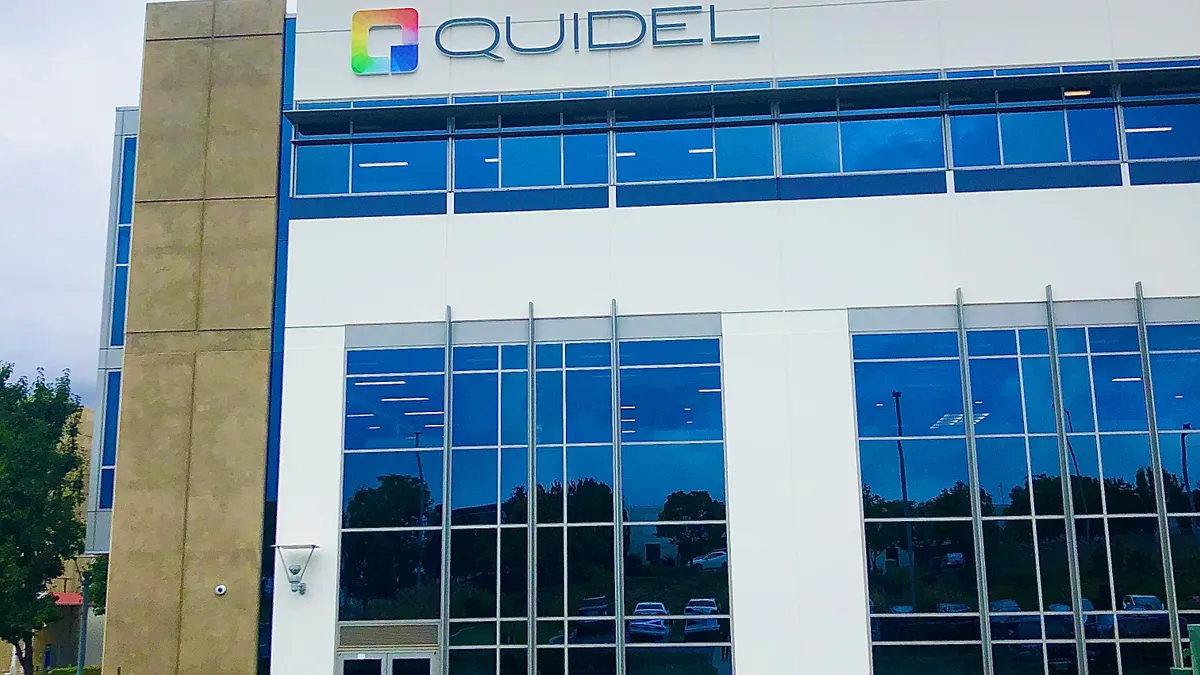UPDATE: July 9, 2021: Quidel noted the tests are not being removed from shelves in the traditional sense of a product recall, rather the notice alerts lab customers of a label update from two months ago. "Our expert laboratory customers at high-complexity labs simply substituted the new labeling in processing" the tests, a statement said. Quidel said it worked with FDA to confirm "a rare potential for patients with high SARS‐CoV‐2 viral loads to be falsely interpreted as negative if target amplification occurs prior to a cycle‐threshold (Ct) value of 5."
Dive Brief:
-
A Quidel recall of more than 18,000 COVID-19 PCR testing kits in the U.S. has been labeled a Class I event by the FDA due to a significant risk of false negative results. Shares fell after news of the recall emerged late Wednesday.
-
The affected diagnostics can deliver false negatives when analyzing samples that contain relatively high amounts of the coronavirus. The problem occurs when the Quidel assays are used with thermocyclers from companies including Roche and Thermo Fisher Scientific.
-
Quidel has received five complaints about the tests, according to the FDA notice. The recall affects Lyra SARS-CoV-2 Assay kits distributed from March 2020 to May 2021 and requires labs to change their process for certain samples. The company did not return a request for comment by the time of publication.
Dive Insight:
Quidel received emergency use authorization for its Lyra assay on March 17 of last year, making it one of the first companies to bring a SARS-CoV-2 test to market in the U.S. A rapid antigen test went on to become Quidel's main pandemic product but the Lyra PCR kit still drove molecular diagnostic sales to new highs.
Now, FDA has categorized a recall of Lyra as a Class I event. The recall affects 18,385 devices, with each kit containing 96 reactions, that were distributed from the day of the EUA through to May 27 of this year. Quidel has received no reports of injuries or death.
The problem arises when PCR amplification occurs at a cycle‐threshold (Ct) value of five or less, indicating a sample contains a relatively high viral load, and one of six thermocyclers from Applied Biosystems, Bio-Rad, Qiagen, Roche and Thermo Fisher is used. In that situation, Lyra can give a false negative.
Quidel has written to affected customers to advise them how to mitigate the problem. For samples with Ct values of five and less, users should perform 1:10 and 1:100 dilutions using uninoculated transport media and test the diluted samples according to the revised instructions for use. Quidel updated the IFU on April 21 with details of the dilution process.
The email to customers that initiated the recall went out on April 26. Talking to investors on a first quarter results conference call the following week, Quidel made no mention of the recall and gave an upbeat assessment of the PCR test.
"Lyra looks pretty solid. I hear other companies talking about the demise of PCR testing, but we're not seeing it. I do think we're taking some customers to them. We haven't seen the falloff that others [have]. It's reasonably stable at this point," Quidel CEO Doug Bryant said.
FDA maintains that molecular tests are typically highly sensitive for the detection of the SARS-CoV-2 virus. However, the agency has warned that all COVID-19 diagnostics may be subject to false negative results which "may lead to delayed diagnosis or inappropriate treatment of SARS-CoV-2 that may cause patient harm, serious illness, and death."











